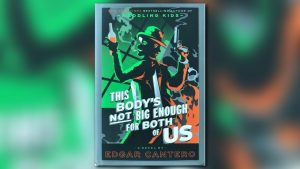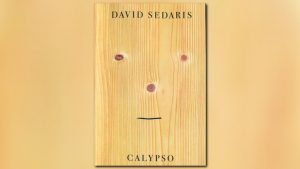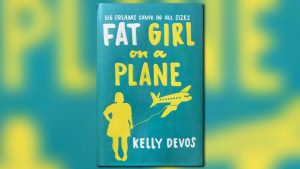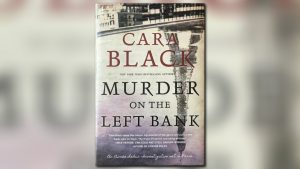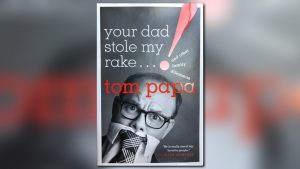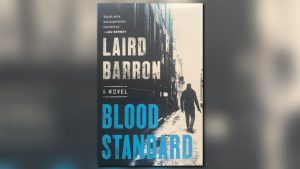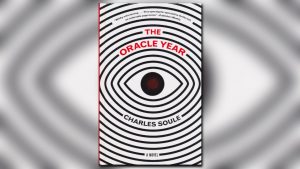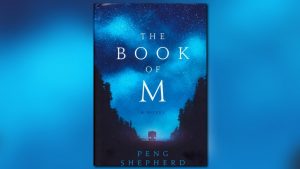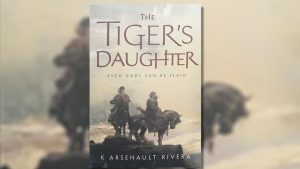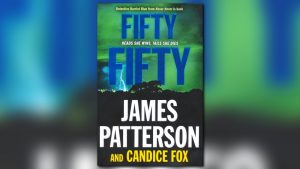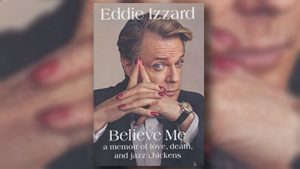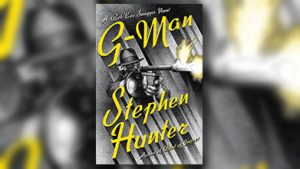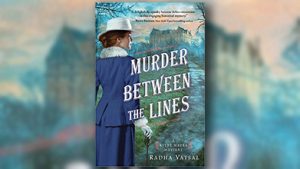“Wild Thing” continues the story of Dr.
Pietro Brnwa, who first appeared in Bazell’s debut novel, “Beat the Reaper.” With his existence constantly under assault by his former employer, this former hit man seeks a way to end these threats permanently.
And, a shady employment opportunity protecting Dr.
Violet Hurst, an obsessive billionaire’s contracted paleontologist, may just provide such an opportunity.
Books & Company 1502
Airdate 04/08/12
ALBERTO RIOS: Welcome to "Books & Company". I'm Alberto Rios, your host, and we're joined today by noted author and physician Josh Bazell, who will be talking about his book, Wild Thing, which is a follow-up to his bestseller Beat the Reaper. And following the further adventures of former mob hitman character Pietro Brnwa. Am I pronouncing the name of the character Brnwa appropriately?
JOSH BAZELL: Well he pronounces it brown-wah; but I try not to take sides.
ALBERTO RIOS: I think it's characteristic of the movement in the book, no time for vowels. I think that speed is a really enchanting and addictive kind of ride through the book. But as an author, you find a way to slow us down and put these kind of magical brakes on with these footnotes. As we are reading the book, I think we have a generous helping of explanatory or parenthetical footnotes throughout. Do you want to talk a little bit about that strategy?
JOSH BAZELL: Sure, there's really two characters in this book, in this one there's a doctor and paleontologist. It's a lot about what it's like to be attached to rationality in a time when rationality is losing its luster for a lot of people, and reality is becoming more personal for a lot of people. He has this need to sort of drop information constantly, to sort of attach himself to the world, which otherwise he feels like he's losing control of. His sense of understanding things is certain kinds of evidence. He's starting to realize that people see the world in completely different ways by different means. So he does kind of sprinkle evidence all around him in an attempt to justify the ways in which he looks at things. Violet is a similar character with a somewhat different strategy, in that she feels very oppressed in certain ways by being a scientist and looking at things rationally all the time.
ALBERTO RIOS: What's interesting about your use of the phrase "scientific method” is we probably tend to think about that in higher terms. But he includes base instincts, as well.
JOSH BAZELL: Sure.
ALBERTO RIOS: It's the scientific method across the board as human beings might live that.
JOSH BAZELL: Right.
ALBERTO RIOS: And names don't pin a thing down.
JOSH BAZELL: Right, right.
ALBERTO RIOS: His own name, in fact, we don't learn his actual name until way later. He goes by the name Dr. Lionel Azimuth. It made me laugh first time I read it. He almost can't say it with a straight face.
JOSH BAZELL: There is something preposterous about it and he sort of feels preposterous about using it, and I think that's sort of why he chose it.
ALBERTO RIOS: I think it's also a wise choice on the part of the author, in that it's kind of a nautical -- it's an astronomical way of finding a direction.
JOSH BAZELL: Right. It's a term that almost everybody has heard and almost nobody understands. I had to look it up myself. It's actually a term that is only useful in terms of certain subjective measurements of angles. It doesn't make a lot of sense from an actual 3-D universal point of view. If you're looking at something and it's off to your right a little bit, you say that's so many degrees to your right. If the object is up in the sky, you have to trace it down an imaginary atmosphere and then find the azimuth of the star.
ALBERTO RIOS: So it's a complication of altitude, right?
JOSH BAZELL: Right.
ALBERTO RIOS: It makes us look at this in different way. I think the book probably takes place in some azimuth space. There's nothing level about what goes on here.
JOSH BAZELL: One of the things I like to do is to have somebody who is absolutely materialistic, not in the desirous of gadgets sense, but in the sense of believing that the world is mechanistic, and place them into ludicrous situations that defy reality to the extent possible. He's been forced to deal with this actually happening. As a writer, I'm forced to imagine this actually happening.
ALBERTO RIOS: It goes beyond being perhaps what we might refer to as cynical or something like that. He has an odd kind of open mind about things. He doesn't have an attitude that is cynical. It's just waiting for the next shoe to drop.
JOSH BAZELL: Right. I'm very pleased that you picked up on that. He's a guy who believes he's cynical. He believes sort of endlessly that things are more bizarre than he thinks they are. I just love that character for that reason.
ALBERTO RIOS: In terms of the plotting, you've got this narrative. Here are these characters and they have been hired to investigate the goings on at White Lake, which is this place.
JOSH BAZELL: Right.
ALBERTO RIOS: There's something happening there, and they are sent there to investigate.
JOSH BAZELL: Right.
ALBERTO RIOS: In that process, any sense of normal investigation is just shot down.
JOSH BAZELL: Right. And they themselves are -- you know, it becomes clear that being a scientist makes you much more likely to be offered a job like that. At the same time, you're much more likely to believe it's utterly impossible in the first place. They both go into the situation sort of chafing over the fact that they are the obvious people for the job, and at the same time they don't think it's even remotely possible that there is a lake monster.
ALBERTO RIOS: And it's a lake monster they are looking for, we may as well say it.
JOSH BAZELL: Right.
ALBERTO RIOS: There's almost a third character. Every time there's just two characters on the page, it's that footnote voice that keeps coming back. It's like listening to the main character speak and explain and say, oh, I should have put that into the book. This is a very clever way on your part to actually include it as a final read for the reader coming onto these pages.
JOSH BAZELL: It's the same character, but it's later. He writes in the present tense and then does footnotes after it's written. It also reveals he has a constant sense of his own ignorance. And the tension between what he knows at the time of the footnote and at the time it's happening, I find amusing.
ALBERTO RIOS: It's more than amusing, it's an important part of the scientific method you're talking about him using. Now it's time. When people talk about translating between languages, for example, they talk about what's lost between two languages. We sometimes don't think to apply it to the language of ourselves, what's lost in our own language, and it's over time --
JOSH BAZELL: Right.
ALBERTO RIOS: -- all sorts of things. He gets to sort of speak both those narratives.
JOSH BAZELL: In fact, Benjamin Warf who created the Warf Superior hypothesis, that language changes experience, said one of the things that sent him on his way was learning Hopi, and learning their sense of time was very different because of that reason.
ALBERTO RIOS: I know this is the wrong read on the movie title, but there's a movie called Now Voyager. I always imagine it being always traveling in the now.
JOSH BAZELL: Right, which is a very Hopi -- because Apocalypse Now, that's more of a reference to Revelations which presumably comes later. Now Voyager really does set you up to experience something in the present. It's like the term contemporary art.
ALBERTO RIOS: You, yourself, are a physician. And the main character is a physician. Do you want to say anything about that?
JOSH BAZELL: Right, and we both have sort of bizarre career paths. He because he's chased by the Mafia, and I because I have been so dedicated and have been for so long to having a writing career at the same time, which has been tough. I think he -- part of the reason I created this guy was I went to medical school at a relatively late age, I was 31 when I started. I think I had a fear of losing my personality. I knew a lot of doctors and some of them were full human beings and some of them had been so ground down by the work it takes that people generally start around age 15 or 16. So I wanted a character who had not only his entire personality at the conclusion of medical school, but it was an enormous personality that was utterly contrary to medical school. And I think that my fears were probably way overblown in the first place, but that's a lot of where he comes from.
ALBERTO RIOS: A lot of what you project onto the page makes that pretty evident. It's not that character you were afraid of, right?
JOSH BAZELL: Right.
ALBERTO RIOS: We have also the paleontologist, Violet Hearst, who is what might traditionally be called the love interest, but this is not a traditional book.
JOSH BAZELL: No, it is not.
ALBERTO RIOS: I don't know if we can say love interest and then keep a straight face. We don't know where she belongs in a lot of ways except she is definitely there.
JOSH BAZELL: Right. And she's, in addition to whatever else she is, she is his other Hardy boy or other Nancy Drew character, and they are sort of partners in the adventure together.
ALBERTO RIOS: Just not in any way we might romanticize. Even though there is a romanticism underneath it, it's not a Pollyanna sort of story.
JOSH BAZELL: The book is about facing reality.
ALBERTO RIOS: It's a pretty tough reality. They are pretty tough with each other.
JOSH BAZELL: They are tough with each other. It's really funny. Part of the reason I'm so obsessive about pacing and having it be as entertaining as possible, is so that I can withhold certain things and frustrate certain desires, and that's definitely one of the things I sort of play with in there.
ALBERTO RIOS: Along with that discussion of traditional characters and nontraditional characters and how the narrative is proceeding, you fill all sorts of information, or the character does.
JOSH BAZELL: Right.
ALBERTO RIOS: To me, one that just stood out, you're going to tell me everybody in the world knows about it. It's the word spandrel.
JOSH BAZELL: Everybody on the street is using that term constantly.
ALBERTO RIOS: Yes, of course.
JOSH BAZELL: It's a term from architecture that refers to the sort of webbing at the top of a column that’s supporting a curved ceiling.
ALBERTO RIOS: Not unlike azimuth.
JOSH BAZELL: You're the only person that has ever figured that out. Thank you.
ALBERTO RIOS: Well, you're welcome.
JOSH BAZELL: We'd have to check the footnotes but I think in the 1970s Steven J. Gould said, if evolution is choosing for certain traits, and that's the way biology works, then it stands to reason that biology is so complicated that it would drag other traits with it. When we do see this, for instance a mitochondrion, which is what enables us to breathe oxygen and be much more energetic than we would otherwise have been, was its own bacteria-like micro-organism. It has its own DNA. It had a separate life before in our ancestors. As a result, certain strange things happened with it. For instance, you only get your mother's DNA from her mitochondria. Which has to do with the fact that male sperm only has it for the tail, because that's where they get all of their energy.
ALBERTO RIOS: If I could sort of jump in.
JOSH BAZELL: Yeah.
ALBERTO RIOS: My understanding of this is there are some things that don't further the species or change.
JOSH BAZELL: That's the question. The question is, are there traits that we have that did not evolve under pressure. There's a spiral all over the abdomen, a huge appendix on the koala bear, in order to digest its food. Not only would there be no evolutionary pressure for it to still exist, there would be some pressure for it to go away, and why hasn't it?
ALBERTO RIOS: Right.
JOSH BAZELL: A spandrel is something that has no purpose. According to its original iteration, we have it because it was attached to something else that was useful.
ALBERTO RIOS: Okay. I'd like to take a moment and remind viewers we're watching ”Books & Company”, I'm Alberto Rios, your host. We're joined today by Josh Bazell who's talking about his book Wild Thing. It has been kind of a wild ride going through the book. You had this great terminology generally, you have the terms that just stopped me in a wonderful way and made me think about what I was reading. Spandrel is one of them. You had another word: Windigo.
JOSH BAZELL: One of the premises of the book is who writes the history. There is this Native American creature called the Windigo, which probably started as a lesson in not eating each other. It's the ghost of a man who eats his family because he's starving to death. The spirit gets stuck in a particular location, usually in water, and it drowns people. That has changed in a European derived western idea into a bigfoot-type character. He's just one more thing when you go back and look at where it came from it’s totally different than you think.
ALBERTO RIOS: It was an exciting part of the book, a word I hadn't heard. It's always fun.
JOSH BAZELL: Brad Wood wrote a novel called The Windigo, it has to have been a hundred years ago. It has been around.
ALBERTO RIOS: Reading the book, one of the things intriguing to me was that it was such a contrast in styles, and it embraced so many styles, so much is happening there, including I think it had poetic moments. There was a wonderful moment where you talk about characters swimming. I think it might have been Violet. She jumps into the water and it's like she's ghosting through onyx. It's a wonderful image.
JOSH BAZELL: I'm obsessed with water that you can't see through. I think I was trying to come up with one more way to describe the water as being utterly black, while distracting from the fact that I was doing that.
ALBERTO RIOS: You have that poetic sensibility and you're giving us that. You also have what I call poetic humor. You talk about your character Violet looking at her friend the doctor and instead of giving him a come hither look, she gives him a go thither look. I have to say it made me laugh. It was a play on elegant language but it was just a nice moment.
JOSH BAZELL: I think a lot of writing is the constant fight against cliché.
ALBERTO RIOS: You did a good turn on it, turning it on its behind there. You've also got kind of a hard-boiled detective moment every now and then. It's not what your book is but you've got these moments that are fun. Sometimes they are funny. So what if he gets clobbered by a beer in the back of the head. Maybe it'll kill him, it won't be the worst thing that's happened to him this week.
JOSH BAZELL: He's pulling beer out of a lake but he's got other issues.
ALBERTO RIOS: He most certainly does. That makes it even funnier. It's true, that's the problem with that statement. You've also got one that I just loved, it's almost a Mickey Spillane line that fits in so well. At the other end of the room a blonde woman in a white T-shirt comes partly out of the kitchen, 45 the hard way. The hard line is such a succinct way of portraying that character with immediacy. So much comes to it, I was taken by it.
JOSH BAZELL: Those are the kinds of things that make it really fun to write.
ALBERTO RIOS: And when you're writing you almost discover them in the moment you're writing. You don't set out to say those things.
JOSH BAZELL: You outline the plot so you don't have to think about the plot.
ALBERTO RIOS: That's how you do it!
JOSH BAZELL: You just look at the page, you riff on the page.
ALBERTO RIOS: That's a good way to say it, you riff on the page. The invention you hope turns out to be part of the narrative.
JOSH BAZELL: Right.
ALBERTO RIOS: You end up telling a story in spite of your sometimes --
JOSH BAZELL: Right, okay.
ALBERTO RIOS: You also have moments that are pure information. I think those are fun, too. You just distinguished for example between the pint glass, the American and English pint glass.
JOSH BAZELL: I'm trying to make a scientific point. I think I quote Judith Stearn, if God wanted us to use the metric system, he would have given us 10 fingers and 10 toes. How do you relate that to an audience? You can tell them they are getting ripped off every time they buy a pint, because an American pint is much smaller than a British pint.
ALBERTO RIOS: Fair enough, it made me laugh. You've got the great detail of the tattoo and the winged staff. Do you want to talk about that for just a second?
JOSH BAZELL: I love playing with assumptions that turn out to be incorrect. One of the things that happens to this character, actually it's mentioned in the first book, he gets a tattoo of a winged staff with two snakes, thinking it's a symbol of medicine. In fact, you do see this thing on ambulances and so forth.
ALBERTO RIOS: I almost think I've seen the double --
JOSH BAZELL: Of course, you have, it's all over the place. But in fact, it's the symbol of Hermes, who among other things is the god of commerce and taking people to the underworld. The symbol is one snake, no wings. It's too late by the time he learns this and he's got this tattoo which is contrary to what he'd meant it to be.
ALBERTO RIOS: You get a misspelled word in your tattoo or something, right?
JOSH BAZELL: He's all about sort of wearing his chains and scars.
ALBERTO RIOS: He just wears it, it's what happened. It's that open-mindedness we talked about earlier, almost fatalistic. It's hard to draw a line between cynicism and optimism. He is more complex than any of those definitions.
JOSH BAZELL: Right. But it is a mess of thinking you've found this man.
ALBERTO RIOS: I know you're a physician, the main character is a physician. He's also a hitman. Are you also a former hitman?
JOSH BAZELL: I've never killed anybody for money, and I'm willing to say that on tape.
ALBERTO RIOS: Where does one get the navigation that allowed you to do this persuasively?
JOSH BAZELL: One gets into a very distinct place. The genre of Mafia memoir where real low-lifes go into the witness protection program and write books about how people used to respect them because they were threatening. They have these sort of very dishonest, superficial mea culpas involved, often in footnote form, where they say they have shaped up.
ALBERTO RIOS: You get the information and garner it from things of people who have really done that.
JOSH BAZELL: As a physician I've worked in jails and so forth. I have met people like that certainly.
ALBERTO RIOS: In fact, the whole narrative almost ends on the impulse toward that.
JOSH BAZELL: Yes.
ALBERTO RIOS: I think that is a -- it's an unnerving kind of ending. It is not one we -- we don't resent it, we don't disagree with it, but it's hard to say that we agree with it. We're almost in that gray area that says, oh, I get it. We're rooting for the "good guy", but who is the good guy?
JOSH BAZELL: He's got very intense homicidal and sexual urges that it's part of his mental life to subdue. He's much better as a killer than as a doctor and that's sort of the irony of his life.
ALBERTO RIOS: That's a great line. We would be remiss if we didn't mention the title, Wild Thing, and the song you mentioned in passing by The Troggs. You also mentioned Link Wray, one of my favorites. Rumble, my phone ringtone.
JOSH BAZELL: Although it's an instrumental song it was banned in New York when it came out. It was thought to incite violence. He's really fantastic. I should say that Wild Thing, the song, was in fact written by Chip Taylor who is not into drugs and happens to be Angelina Jolie's uncle.
ALBERTO RIOS: The Troggs, interestingly enough for the purposes of the book, they were originally called The Troglodites.
JOSH BAZELL: They have become -- enough time has passed that they have become these sort of seminal evolutionary rock people themselves.
ALBERTO RIOS: Absolutely. And you know, not that they are thick-headed, but you describe these characters as being pretty much of the moment and of the place and of the event. We're not surprised when they walk into these different situations. A lot of physicality, a lot of base-ality, it's in the body of this doctor, he's not just brain, he's full body. It's kind of a life that, you know, we get. We have intimations about what his life was before this. I think that is in the earlier book in Beat the Reaper.
JOSH BAZELL: Right.
ALBERTO RIOS: We get all of this, and I think it forms a character who becomes pretty memorable. I want to thank you for that.
JOSH BAZELL: Thank you very much.
ALBERTO RIOS: Anything you'd like to add about this that we've missed? I think the book covered so much we could just go on and on about this.
JOSH BAZELL: I would just say in terms of people being governed by their brains, as a physician that has a very different meaning anyway. The parts of your brain all run simultaneously, including the lizard parts that control your emotions.
ALBERTO RIOS: The chorus of us and who we've been.
JOSH BAZELL: Nice.
ALBERTO RIOS: And maybe regarding who we're going to be.
JOSH BAZELL: Right.
ALBERTO RIOS: I would like to thank you all for watching us. This has been “Books & Company”; I'm Alberto Rios, your host. We've been joined today by Josh Bazell, author and physician, not hitman, who's been talking about his book Wild Thing. We hope you'll join us again next time when we bring you another good book.
JOSH BAZELL: Thank you, professor.
ALBERTO RIOS: My pleasure.








